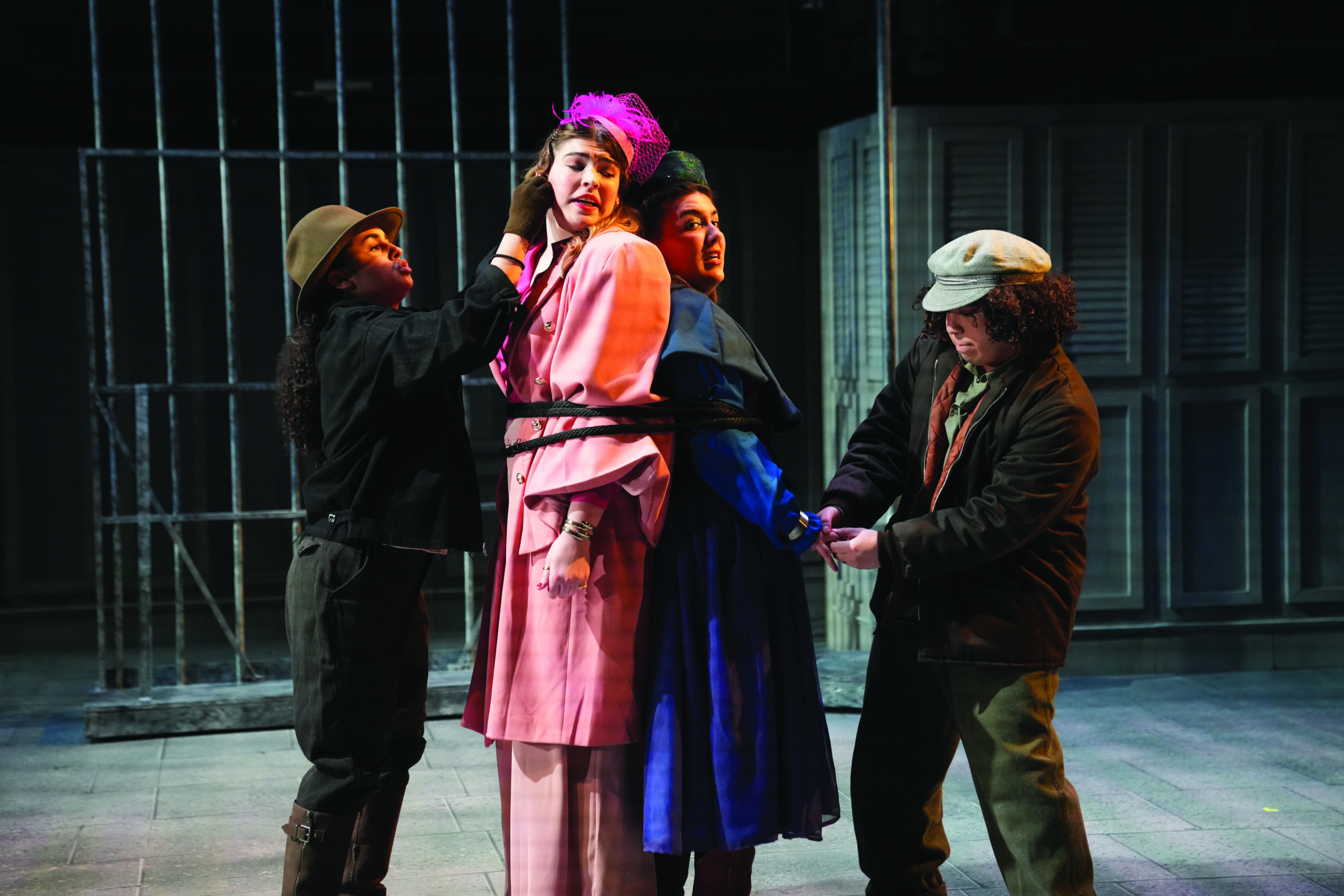Celebrating LACLaS at 25 years with “Valor, Outrage and Woman”
March 1, 2024
 Courtesy of Alex Cornell du Houx
Courtesy of Alex Cornell du HouxThis academic year marks the 25th anniversary of the College’s Latin American, Caribbean and Latinx Studies (LACLaS) Program. The weekend will be packed with arts events in celebration, including guest speaker conversations, an alumni reception, a concert and Bowdoin’s first-ever bilingual theater production.
The play, 17th-century Spanish playwright Ana Caro’s “Valor, Outrage and Woman,” was translated from Spanish to English by an effort at the University of California, Los Angeles called “Diversifying the Classics.” For the Bowdoin adaptation, director Sylvia Cervantes Blush worked with Associate Professor of Romance Languages and Literatures and Margaret Boyle, the LACLaS program director, to reintegrate some Spanish back into the script.
Blush said the production is representative of women’s role in Spanish theater and society: Its plot follows a woman seeking revenge on someone who made a false promise of marriage.
“In that time period [when “Valor” was written] … Shakespeare is doing his stuff, and women are not allowed on stages in England. But in Spain, women are on stage,” Blush said. “It’s really subverting the myths of what Spain might have looked like.”
Through the cross-dressing of the protagonist, Leonor, the play questions expectations of gender, masculinity and femininity.
“There’s a line in the play where [Leonor] says, ‘I feel like I’m a changed person,’ simply because she’s changed how she’s dressed,” Blush said. “By changing how she’s dressed and what society views a woman’s strength to be, she’s realized, ‘It doesn’t matter what I’m wearing because inside I’m changed, and I feel like I have more power than I thought I did.’”
“Valor, Outrage and Woman” opened last night and will continue tonight and tomorrow night at 7:30 p.m. in Wish Theater. After yesterday’s and tonight’s productions, Boyle organized conversations with guest speakers to reflect on the play’s themes of intersectionality, Latin American identity and gender studies.
“I’m Mexican-American, and I didn’t learn about Spanish classical theater until I was a college student. I believe really strongly in the mission of Diversifying the Classics,” Boyle said. “Latino and Hispanic students deserve to have their cultural heritage celebrated and recognized.”
Another one of Boyle’s goals through this event was increasing the accessibility and awareness of Spanish theater.
“We’re making it bilingual theater…. We just really want to center what that means for the campus,” Boyle said. “On the music side … two of the [guest speakers] are musicologists. And we’ll [talk about] something similar around bilingualism and performance in that context.”
In addition to hosting their own concert today at 4 p.m. in Studzinski Recital Hall, the musical group Ensemble La Chimera will play early Spanish music for “Valor.” Blush was initially connected with Ensemble La Chimera through Assistant Professor of Music Ireri Chávez-Bárcenas, who emphasized that the music for the play is important in highlighting its bilingual element.
“At least for me, it was really important to bring back Spanish—and not only the language … but also the syntax, the verse and so much of the tradition of singing Spanish,” Chávez-Bárcenas said.
She noted that the chosen repertoire of music is intended to highlight not only the Spanish culture from which the play came from but also the Latin American cultures that were influenced by it.
“To me, it was important to bring back the sounds from songs that were actually composed around the time when Ana Caro was writing and around the time when her audience went to the theater,” Chávez-Bárcenas said. “It was important for us to bring some of the sounds from that time.”
Chávez-Bárcenas chose songs that resonated with the script and themes of the play, like “Marizápalos,” a traditional song from the 17th century that was widely recognized at the time “Valor” was written.
“[‘Marizápalos’] was a song that circulated and was adapted by many manuscripts and print editions [of “Valor”], not only in the Iberian peninsula, but also in Peru and in Mexico,” Chávez-Bárcenas said. “As a music historian, it was important to bring those sounds back into the theater. Early music probably seems very distant or unfamiliar, but … sometimes when you hear this music performed by actual musical instruments from that time, there is some novelty in that.”
According to cast member Reynaldo Fuentez ’26, the cast initially only rehearsed with recordings from the ensemble, adding that he noticed a shift after rehearsing with live music.
“Having [Ensemble La Chimera] there shifts the way that we act and how we pronounce our lines,” Fuentez said. “And [Blush] has such great energy to be with, and she balances having fun and also getting things done. I think that’ll really reflect in our performance.”
Reflecting on her production and its context within the 25th anniversary of LACLaS, Blush articulated her belief in the arts as a rich method to celebrate and explore the intersectionality of Latin American identity.
“The arts have a beautiful way of holding up a mirror to our current society. When we can do our job well as storytellers … then the audience leaves, hopefully, with their own mirror thinking ‘How do I fit into this narrative, and is there something that I can do to better my small community?’” Blush said. “Because then that ripples out on a greater scale, your small community of friends ripples out to maybe family, [which] ripples out to bigger communities and so forth. And I think that that’s how you change the world—one little ripple at a time.”

Comments
Before submitting a comment, please review our comment policy. Some key points from the policy: